Excavation Contractors West Kilbride
Top Excavation Companies in West Kilbride
Receive 3 FREE Excavation Companies quotes for your project today! Compare profiles, reviews, accreditations, portfolio, etc... and choose the best deal.

Drain Fix Solutions
4.961 reviewsGlasgow, GBAbout Us We are a locally owned business covering Glasgow and the West with over 8 years experience in the drainage industry. All our staff are fully trained and qualified so you know you are in the best hands when it comes to your drainage issues. We have probably dealt with every drainage problem imaginable so there’s not an issue too small or big. Our phone lines are operational 24/7 so you can call us anytime to book in your appointment. We specialise in all aspects of Domestic and Commercial Drainage issues and aim to carry out the works as quickly and efficiently as possible meaning less disruption for our customers. We offer a mix of fixed pricing and job rates for our services and all works are explained to you prior to commencement to ensure you are aware of what the job entails and the cost before starting. Please click on one of our services to find out more.
- Services
- Why Us?
- Testimonials
- Gallery
Get Quote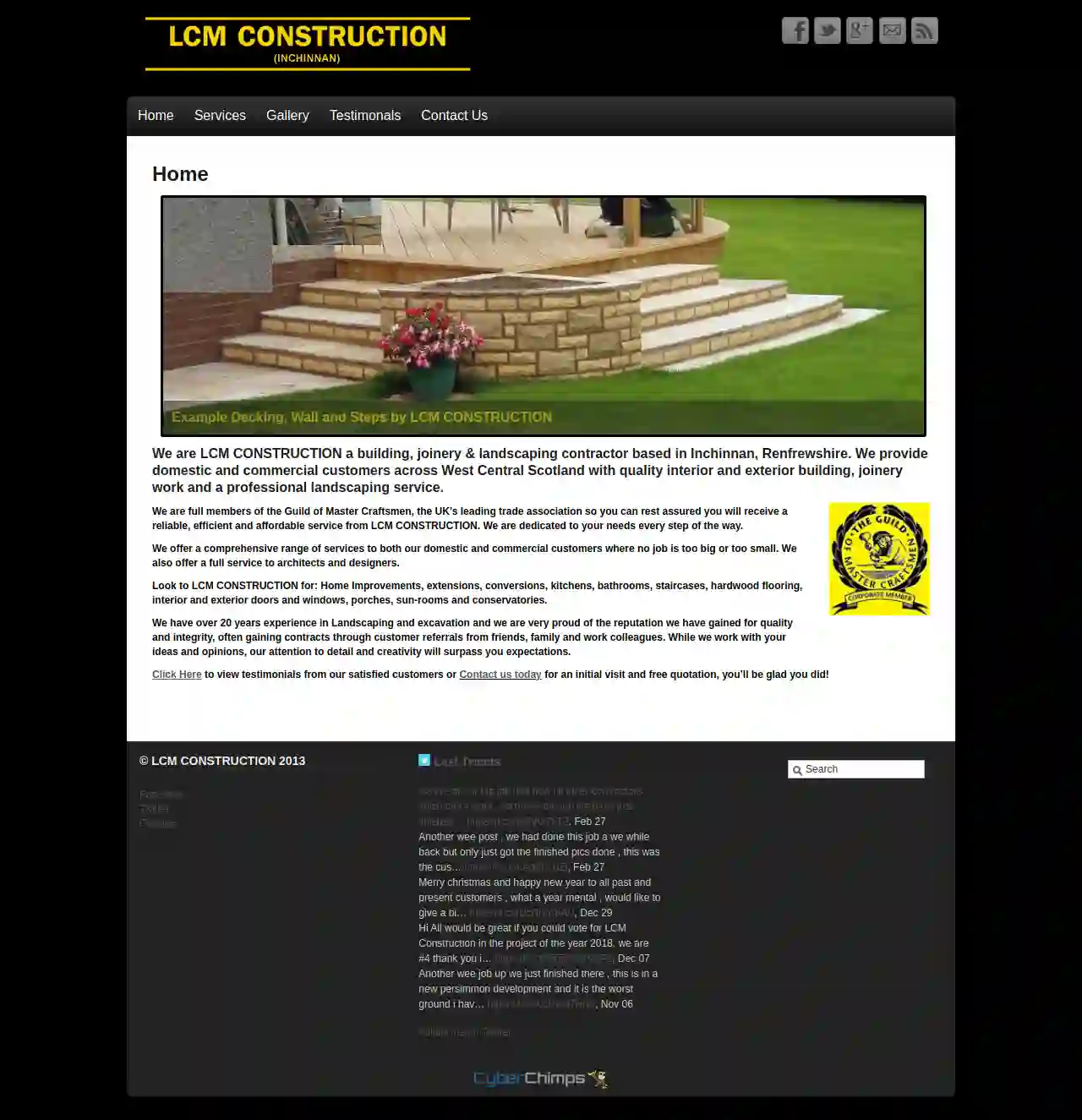
LCM Construction
51 reviewsUnit 1, Inchinnan Business Park, Renfrewshire, Inchinnan, PA4 9SF, GBLCM CONSTRUCTION: Your Trusted Building, Joinery & Landscaping Experts LCM CONSTRUCTION is a reputable building, joinery, and landscaping contractor based in Inchinnan, Renfrewshire. We cater to both domestic and commercial clients across West Central Scotland, delivering high-quality interior and exterior building, joinery work, and professional landscaping services. As full members of the Guild of Master Craftsmen, the UK's leading trade association, we guarantee reliable, efficient, and affordable services. Our commitment to your satisfaction is unwavering, guiding us every step of the way. We offer a comprehensive range of services, handling projects of all sizes. Whether you need home improvements, extensions, conversions, kitchens, bathrooms, staircases, hardwood flooring, interior and exterior doors and windows, porches, sun-rooms, or conservatories, we've got you covered. We also extend our expertise to architects and designers, providing a full service to meet their needs. With over 20 years of experience in landscaping and excavation, we've built a strong reputation for quality and integrity. Our dedication to excellence often leads to new contracts through referrals from satisfied customers, friends, family, and colleagues. We work closely with your ideas and opinions, but our attention to detail and creativity will exceed your expectations. Explore our testimonials to hear firsthand from our satisfied customers. Contact us today for an initial visit and a free quotation. You won't regret it!
- Services
- Why Us?
- Gallery
Get Quote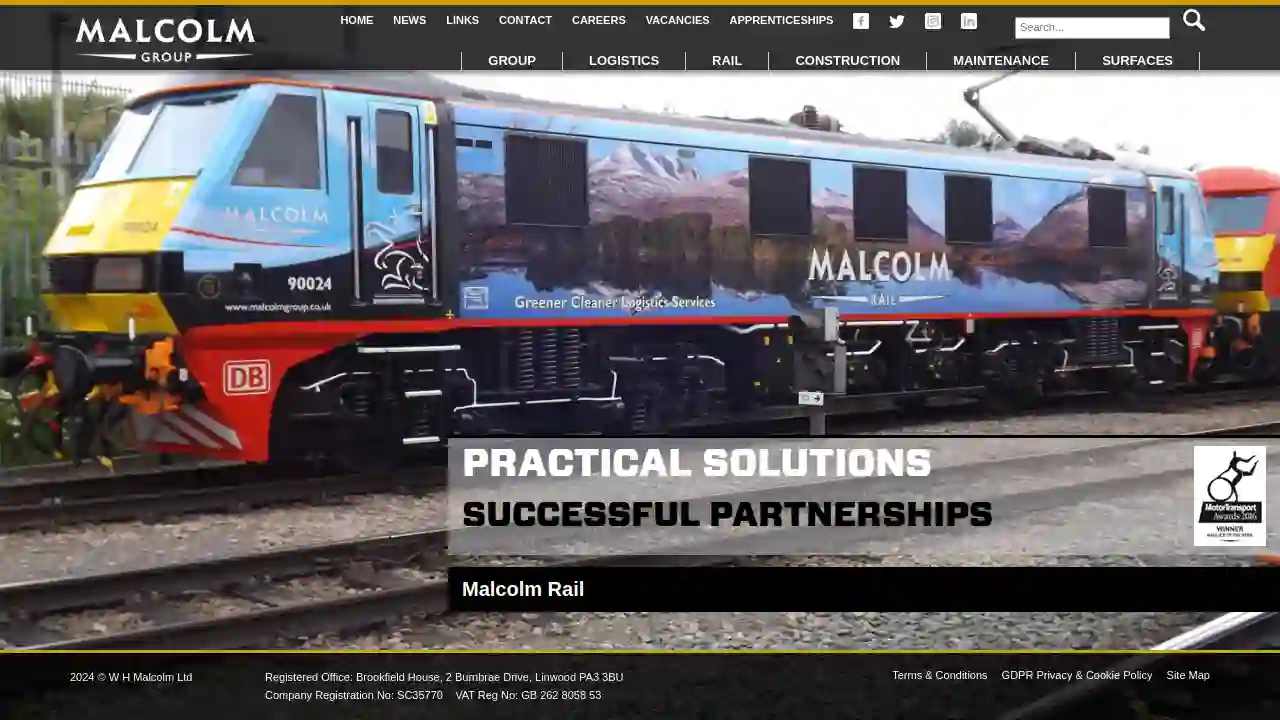
Malcolm Construction
441 reviewsBrookfield House, 2 Burnbrae Drive, Linwood, PA3 3BU, GBThe Malcolm Group The Malcolm Group is a leading provider of practical solutions to businesses throughout the UK. We offer a wide range of services, including logistics, rail, construction, maintenance, and surfaces. We are committed to providing our customers with the highest quality of service and value for money. Our History The Malcolm Group has a long and proud history, dating back to 1934. We have grown from a small family business into a major player in the UK economy. We are committed to investing in our people and our infrastructure to ensure that we can continue to provide our customers with the best possible service. Our Values Our values are at the heart of everything we do. We are committed to: Providing our customers with the highest quality of service Investing in our people and our infrastructure Being a responsible and sustainable business Building strong relationships with our customers and suppliers
- Services
- Why Us?
- Gallery
Get Quote
W H D Plant
4.73 reviewsBlack Gaet, Scalloway, Shetland, ZE1 0TZ, GBEXPERIENCE WHD PLANT LTD is a Civil Engineering company. We are here to provide a large and diverse number of services, undertaking both large and small contracts of varied composition always approaching them with a high standard of workmanship. SERVICES PROVIDED WHD PLANT LTD is a family business run by a father and two sons: Neil Nicolson, Kevin Nicolson and Brian Nicolson. The company was incorporated in 2004 and boasts a leadership team with over 40 years of experience in the civil engineering construction industry. WHD Plant Ltd is fully committed to a programme of Health and Safety. All projects are approached and executed as per the ‘Health & Safety Policy Statement. The same uncompromising high standards, which are evident throughout all the works, both completed and in progress, are displayed through the exemplary safety record and applied to projects of both major and minor proportions. WORKMANSHIP WHD Plant Ltd is a limited company who have displayed their ability to provide a large and diverse number of services under its heading as civil engineering contractors. Contracts undertaken by the company are varied in composition and value and all are approached with the same high standard of workmanship. WHD Plant has provided, and will continue to provide, a safe, professional and efficient service to our clients. BASE OF OPERATIONS WHD Plant Ltd have their premises at the Black Gaet, Scalloway which provides a very central location in Shetland. Located here is the company's warehouse with a reinforced concrete floor space measuring 600 square meters and a separate office at the entrance to the premises.
- Services
- Why Us?
- Our Team
- Gallery
Get Quote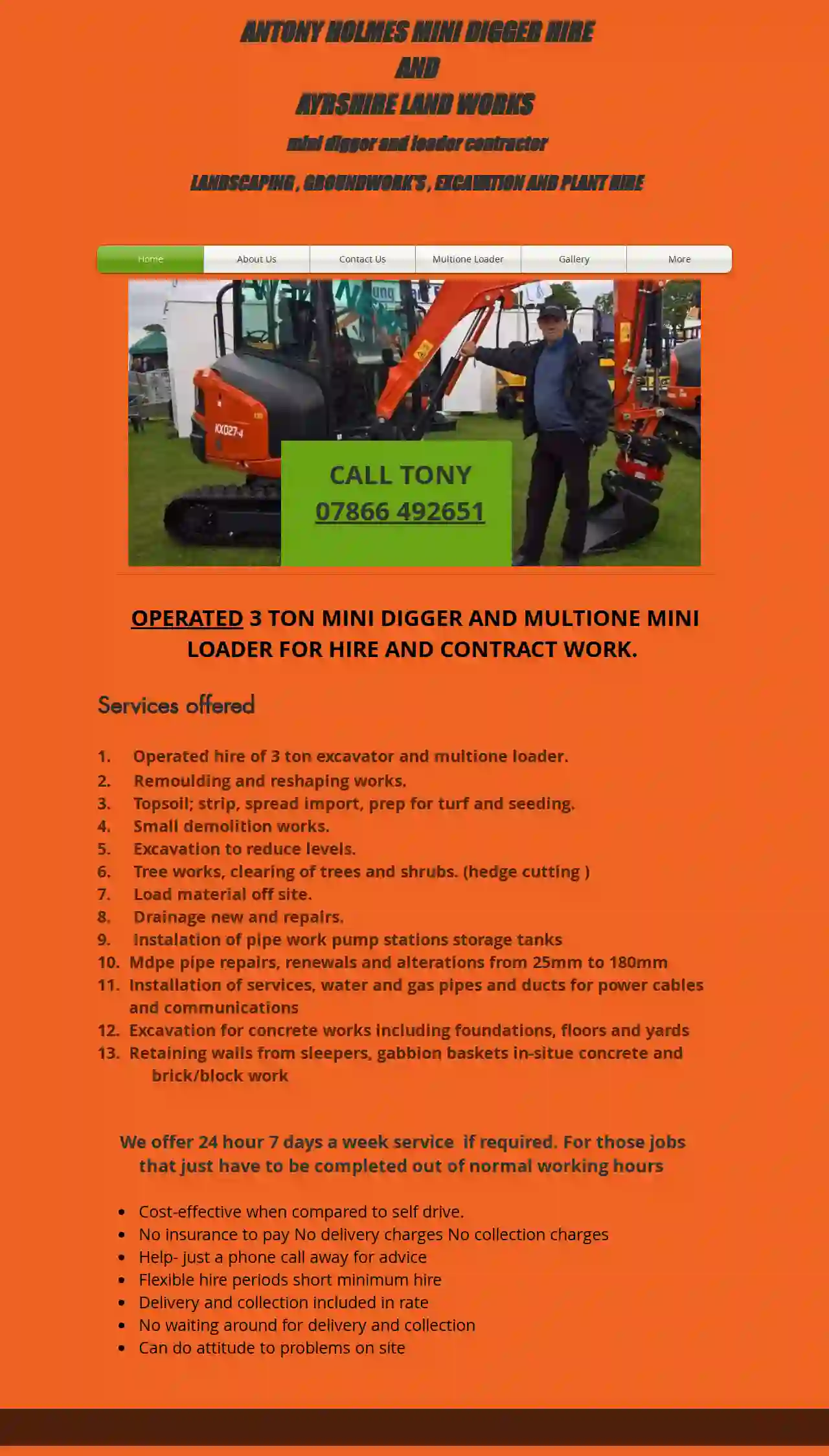
Antony Holmes Mini Digger Hire
59 reviewsAyr, GBAntony Holmes Mini Digger Hire and Ayrshire Land Works We are a mini digger and loader contractor specializing in landscaping, groundwork, excavation, and plant hire. We offer a wide range of services to meet your needs, including: - Operated hire of 3 ton excavator and multione loader - Remoulding and reshaping works - Topsoil: strip, spread import, prep for turf and seeding - Small demolition works - Excavation to reduce levels - Tree works, clearing of trees and shrubs (hedge cutting) - Load material off site - Drainage new and repairs - Installation of pipe work pump stations storage tanks - MDPE pipe repairs, renewals and alterations from 25mm to 180mm - Installation of services, water and gas pipes and ducts for power cables and communications - Excavation for concrete works including foundations, floors and yards - Retaining walls from sleepers, gabbion baskets in-situ concrete and brick/block work We offer a 24-hour, 7-days-a-week service if required. For those jobs that just have to be completed out of normal working hours, we are here to help. Our services are cost-effective when compared to self-drive, with no insurance, delivery, or collection charges. We offer flexible hire periods with short minimum hire, and delivery and collection are included in the rate. We are always happy to help with advice and have a can-do attitude to problems on site.
- Services
- Why Us?
- Gallery
Get Quote
ECOTECH
Office 1 Cameron House 17 Glasgow Road, Hardgate, Clydebank, Scotland, G81 5PJ, GBRENEWABLE ENERGY IN SCOTLAND Contact our electricians at Ecotech Contracts Ltd. We serve Glasgow and across the UK and Republic of Ireland. OVER 50 YEARS' EXPERIENCE Ecotech Contracts Ltd is a Scotland based solar energy company dealing with commercial clients across Scotland. With the cost of energy rising at an unimaginable pace, it is the aim of Ecotech Contracts Ltd to help large businesses take control of these cost increases using the huge potential for energy generation found within solar technology. SOLAR FOR THE HOME At Ecotech Contracts Ltd in West Dunbartonshire, we can help you towards making major savings on your energy bills by installing solar panels for your home. Excess energy can either be stored by you or sold to the grid. WIND TURBINES Our highly skilled team has installed over 10 wind and solar farms across the UK. A wind turbine can produce an enormous amount of green energy for your business and is a fantastic signpost that your business is committed to sustainability. EV CHARGING With the rising cost of petrol, and more investment in the EV industry, it’s no wonder that EVs are becoming increasingly popular. Charging an EV can take as little as 30 minutes. DOMESTIC RETROFIT WORK We provide whole house retrofit assessments, to assess all required energy efficiency measures to ensure properties are progressing towards the 2050 net zero target in line with PAS 2035 standards. COMMERCIAL SOLAR Solar panels can be an excellent return on investment and increase your eco-credentials, and they can recoup their installation costs in a few years. How ecologically friendly your business is will increasingly influence potential customers. BATTERY STORAGE It is possible to sell any excess energy to the grid, however more and more people are opting to invest in battery storage so they can use all the energy they produce. ELECTRICAL CONTRACTING We have many years’ experience across all sectors of industry. For all kinds of domestic, industrial, and commercial electrical projects we exceed expectations and provide an excellent service. Our Project Managers will ensure the work is completed safely and efficiently. PPA Ecotech Contracts Ltd are a developer and work in partnership with an investor in renewable energy projects across many markets including the UK. As part of this, we offer a range of energy supply options, which have the potential to reduce customers' energy costs whilst offering 100% renewable energy supply.
- Services
- Why Us?
- Our Team
- Gallery
Get Quote
Util-Serve Ltd
58 reviewsGlasgow, GBBased In Glasgow and supplying the surrounding areas... Here at Util-Serve Ltd we are your local experts for any and all drainage related services. Using the latest tools and equipment that the industry can offer, we can provide you with one of the most efficient services in the local region. Choosing to work with Util-Serve Ltd means that you will be working with one of the very best teams in the industry. All of our engineers have been trained and qualified from the industry-leading training provider, giving them in-depth and expert knowledge. Free no obligation quotations We want to help give you a clear picture of our services. Talking to one of our professionals we can provide you with a free no-obligation quotation, going into detail about the job and showing you what needs to be done. They will then provide you with a quotation to allow you to make an informed decision before you agree to go ahead with the project. OUR CUSTOMER REVIEWS At Util-Serve Ltd our main focus is providing our customers with the very best service possible, always looking for ways to adapt and fit your needs. Through this constant effort and development of our service we have gained a reputation for our quality of work and customer care. Take a look at our reviews from Yell.com to see what some of our existing customers have had to say
- Services
- Why Us?
- Gallery
Get Quote
EBS Construction
3.89 reviews10 Loanbank Quadrant, Glasgow, G51 3HZ, GBEBS Construction: Your Trusted Partner for Property Maintenance and Restoration in Glasgow EBS Construction is a leading provider of property maintenance and restoration services in Glasgow. We are experts in all aspects of building restoration, including lime mortar, lead work, slate work, and specialist masonry. Our team of fully trained and highly skilled professionals across all trades ensures that we deliver a high-quality and fully comprehensive service. Our Commitment to Excellence At EBS Construction, we are committed to providing our clients with the highest quality workmanship and customer service. We subscribe to Construction Line, the UK register of Pre-Qualified Construction Services, giving our clients the assurance of our expertise and reliability. Our Services We offer a wide range of services, including: Project Management Conservation and Restoration work Specialist Masonry Re-pointing; lime mortar Structural repairs Roof repairs Complete internal and external decoration Domestic large and small Lead work Slate work Timber rot eradication Our Approach We are dedicated to delivering cost-effective and time-efficient solutions without compromising on quality. We utilize the latest industry technology from the initial planning stages to accurately plan and forecast projects. Our Directors and team of professional tradesmen work diligently to ensure that your project is completed to the highest standards, on schedule, and within budget. Why Choose EBS Construction? We are a trusted and experienced team with a proven track record of delivering exceptional results. We are committed to providing our clients with a seamless and stress-free experience. Contact us today for a free, no-obligation quote and let us help you bring your project to life.
- Services
- Why Us?
- Gallery
Get Quote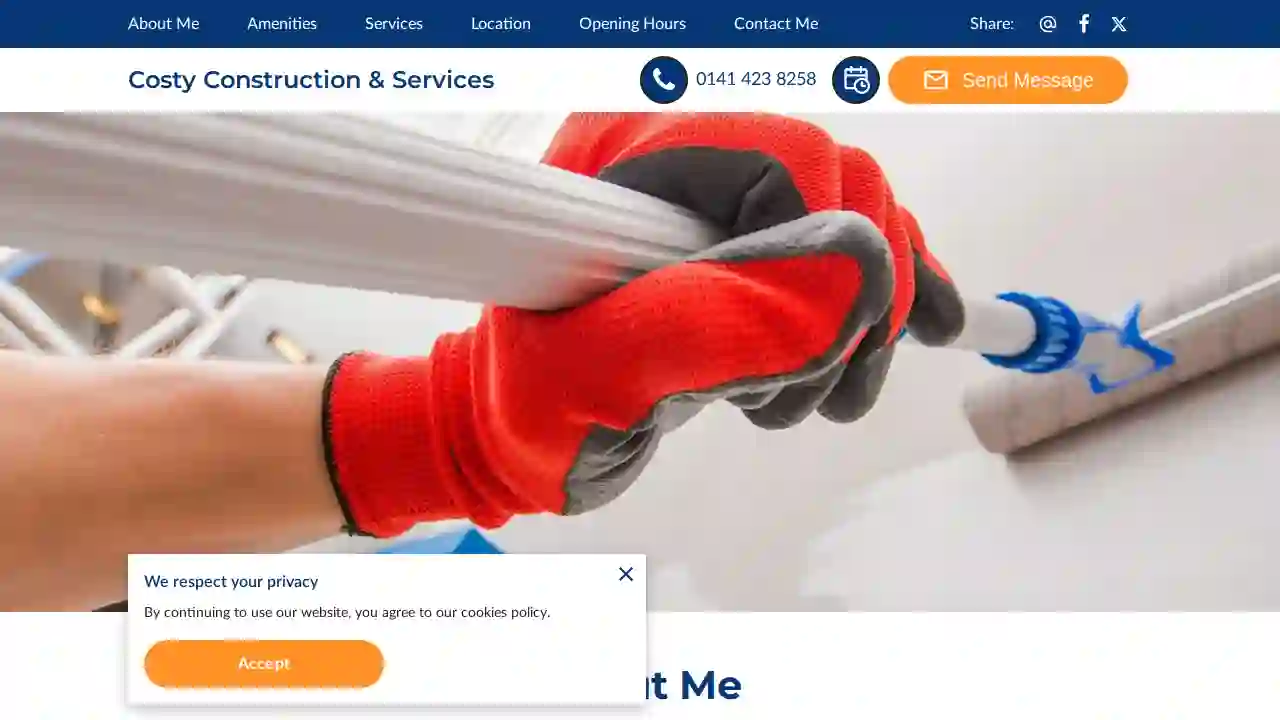
Costy Construction & Services
Langside Rd, Glasgow, G42 8XX, GBAbout Me Here at Costy Construction And Services we offer an exceptional range of construction services in the greater Glasgow area. From concrete foundation work to excavation, brickwork and architectural advice our experienced builders understand the best solutions that work for you. We’re all dedicated to our roles and work hard to get the job done. Give us a call on +441414238258 and we can discuss any of your construction needs. Excavation Experts Are you putting together a blueprint for a property or building? If you are, we can deliver expert excavation services to prepare a new build for the foundations and basis of your construction. We understand the demands that are placed on you so work with your goals in mind to prepare and excavate the land by the most efficient means possible, using a combination of manpower and highly technical heavy duty vehicles. Prepare Building sites for Foundations Whether you’re a large commercial construction contractor or a homeowner looking to begin work on an extension or conservatory, our experienced technicians offer wholesale excavation services to prepare your property or site for the building work that will ensue. We prepare the ground for foundations and work with the blueprint in mind to ensure water and electrical systems are ready to be fitted as soon as we’re finished with the excavation process.
- Services
- Why Us?
Get Quote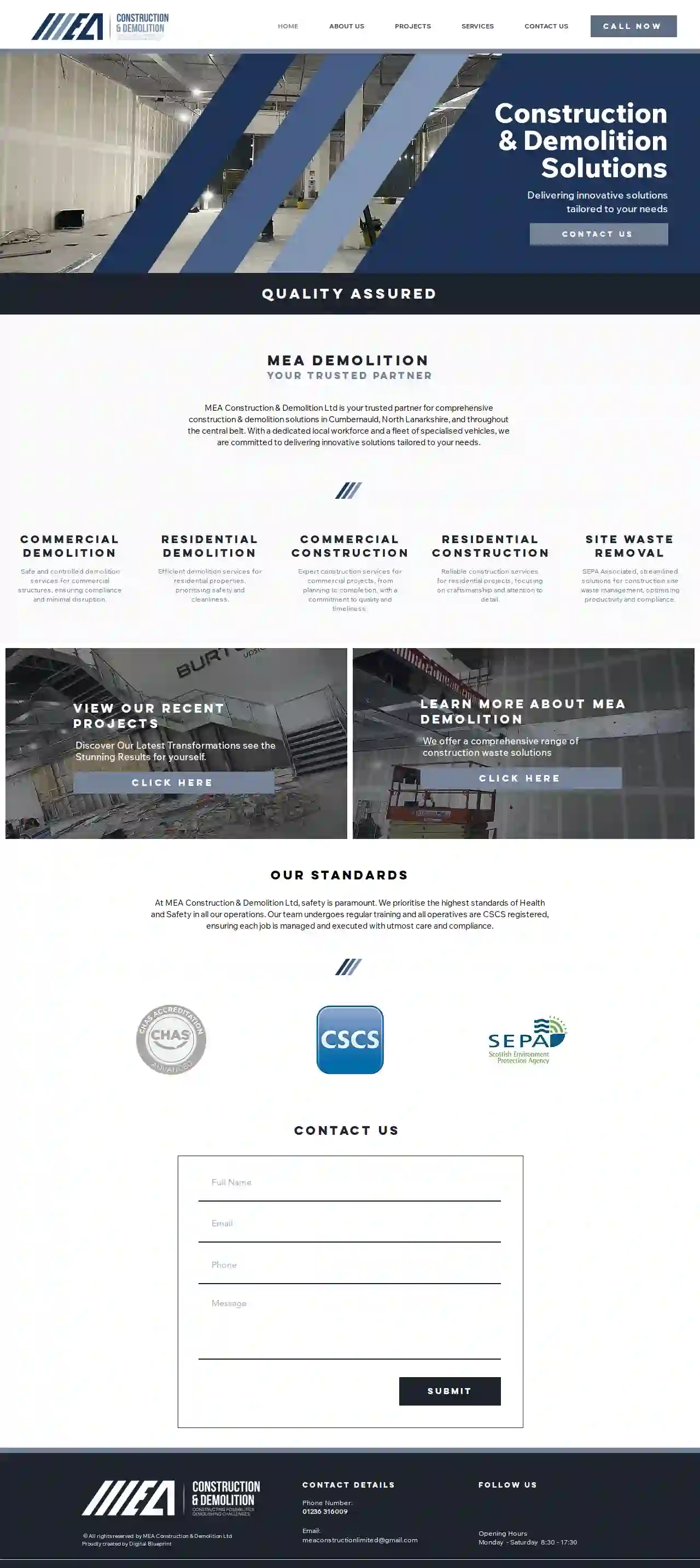
MEA Construction & Demolition
Glasgow, GBMEA Construction & Demolition Ltd Your trusted partner for comprehensive construction & demolition solutions in Cumbernauld, North Lanarkshire, and throughout the central belt. With a dedicated local workforce and a fleet of specialised vehicles, we are committed to delivering innovative solutions tailored to your needs.
- Services
- Why Us?
- Gallery
Get Quote
Over 13,059+ Excavation Companies in our network
Our excavation companies operate in West Kilbride and beyond!
ExcavationHQ has curated and vetted Top Excavation Pros near West Kilbride. Find the most trustworthy business today.
Frequently Asked Questions About Excavation Contractors
- Excavations Deeper Than a Certain Depth: This varies by jurisdiction, usually around 5 feet.
- Excavations Near Utilities: Digging near buried utilities (gas, water, electric) often requires permits and utility locates to prevent damage.
- Excavations Affecting Public Property: Projects impacting sidewalks, roads, or other public areas typically require permits.
- Excavations in Environmentally Sensitive Areas: Projects in wetlands, floodplains, or other sensitive areas might need special permits.
- Clearly Define the Scope: Outline the project's goals, including the excavation area, depth, grade, and intended use.
- Obtain Necessary Permits: Research and acquire any required permits from your local authorities.
- Mark Utility Lines: Contact your utility companies to locate and mark underground utilities to prevent damage.
- Communicate with Neighbors: Inform your neighbors about the project's timeline and potential noise or disruptions.
- Prepare the Site: Clear any obstacles, such as vegetation, furniture, or structures, from the excavation area.
- Discuss Safety Protocols: Review safety procedures with the contractor to ensure a safe work environment.
- Experience: Choose contractors with a proven track record and years of experience in excavation projects similar to yours.
- Licensing and Insurance: Verify that they are properly licensed to operate in your area and carry adequate insurance to protect you from liability in case of accidents or damage.
- Equipment and Resources: Ensure they have the necessary equipment and resources to handle your project efficiently and safely.
- Positive Reviews and References: Check online reviews and testimonials from previous customers. Request references and contact them to inquire about their experience with the contractor.
- Professionalism: Opt for a company that communicates clearly, provides detailed and transparent estimates, and has a responsive and courteous team.
Do I need a permit for excavation?
What is the difference between excavation and grading?
Excavation: Primarily involves removing earth or other materials from a site. It's about digging down and creating space.
Grading: Focuses on shaping and leveling the ground to a specific slope or elevation. It's about adjusting the existing terrain.
For example, you might excavate a foundation and then grade the surrounding area to ensure proper drainage and a level surface for landscaping.
What should I do before excavation starts?
How do I find a good excavation contractor?
Do I need a permit for excavation?
- Excavations Deeper Than a Certain Depth: This varies by jurisdiction, usually around 5 feet.
- Excavations Near Utilities: Digging near buried utilities (gas, water, electric) often requires permits and utility locates to prevent damage.
- Excavations Affecting Public Property: Projects impacting sidewalks, roads, or other public areas typically require permits.
- Excavations in Environmentally Sensitive Areas: Projects in wetlands, floodplains, or other sensitive areas might need special permits.
What is the difference between excavation and grading?
Excavation: Primarily involves removing earth or other materials from a site. It's about digging down and creating space.
Grading: Focuses on shaping and leveling the ground to a specific slope or elevation. It's about adjusting the existing terrain.
For example, you might excavate a foundation and then grade the surrounding area to ensure proper drainage and a level surface for landscaping.
What should I do before excavation starts?
- Clearly Define the Scope: Outline the project's goals, including the excavation area, depth, grade, and intended use.
- Obtain Necessary Permits: Research and acquire any required permits from your local authorities.
- Mark Utility Lines: Contact your utility companies to locate and mark underground utilities to prevent damage.
- Communicate with Neighbors: Inform your neighbors about the project's timeline and potential noise or disruptions.
- Prepare the Site: Clear any obstacles, such as vegetation, furniture, or structures, from the excavation area.
- Discuss Safety Protocols: Review safety procedures with the contractor to ensure a safe work environment.
How do I find a good excavation contractor?
- Experience: Choose contractors with a proven track record and years of experience in excavation projects similar to yours.
- Licensing and Insurance: Verify that they are properly licensed to operate in your area and carry adequate insurance to protect you from liability in case of accidents or damage.
- Equipment and Resources: Ensure they have the necessary equipment and resources to handle your project efficiently and safely.
- Positive Reviews and References: Check online reviews and testimonials from previous customers. Request references and contact them to inquire about their experience with the contractor.
- Professionalism: Opt for a company that communicates clearly, provides detailed and transparent estimates, and has a responsive and courteous team.